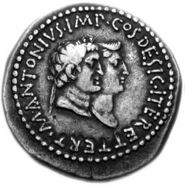Flamen Divi Iulii
In the religio Romana the flamen Divi Iulii was the priest of Divus Iulius.[1] He was the fourth and most influential of the so-called flamines maiores, the archpriests of the Roman flaminate. After two years of inofficial worship of the divinized Julius Caesar, the new priestly office was introduced together with the senatorial consecration (consecratio) of Divus Iulius in 42 BC, but remained unoccupied until 40 BC.
Origin
In early 44 BC the Senate had decided that Caesar would receive an official apotheosis to state god and be given the god name Divus Iulius. During the same session the inauguration of the respective priestly office was also decreed and Mark Antony designated as the first flamen Divi Iulii.[2] The original rationale for the creation of a new flamen maior can be found in early Roman history, when legendary king Numa fathered the third great flamen, the flamen Quirinalis, the priestly office of the god Quirinus, who would later be identified as the ascended Romulus, once the latter's brutal slaying by the senators had been virtually forgotten. Since Julius Caesar, the founder of the new Rome, had often been identified with the original founder Romulus, he regarded Numa's theopolitics as a precedent for introducing his own flamen maior for the time following his planned apotheosis.
In his function as pontifex maximus Caesar himself chose Antony for the office using the ritual of captio. He couldn't designate his nephew Gaius Octavius, because he had already planned for him to become his political heir. But Mark Antony was equally suited for the office, because he was a close confidant of Caesar and a near relative through his mother Iulia. In addition he had been augur since 50 BC and later magister of the newly established luperci Iulii. He hadn't exercised a political office since 47 BC, when he assumed consulship in 44 BC together with the dictator perpetuo. Following Caesar's captio Mark Antony was at first unable to inaugurate, because he was a plebeian. On the basis of the lex Cassia of 45 BC Caesar however had the right to elevate him (and Gaius Octavius) to the status of patrician.
The fact that Marc Antony's parents hadn't been wedded with the ancient ritual of the confarreatio was obviously ignored in this case. Furthermore, a destinatus for the office of a flamen maior needed to be married by confarreatio himself, a requirement which Marc Antony was unable to meet at first. After Caesar's death the situation provoked malicious remarks by the anti-Caesarian fraction[3] and forced Caesar's political heir Octavian into action. But only after the successful peace negotiations at Brundisium in October 40 BC was Mark Antony able to inaugurate as flamen Divi Iulii on Octavian's request, because by then Antony's plebeian wife Fulvia had died and his new wife Octavia, the sister of Octavian, had been lawfully wedded to him by confarreatio.
Attributes
later
Office holders
later
References
- ↑ The office is sometimes also called flamen Iulialis, rarely flamen Caesaris.
- ↑ Lucius Claudius Cassius Dio Cocceianus, Roman History 44.6.41; Marcus Tullius Cicero, Philippics 2.110
- ↑ Marcus Tullius Cicero, Philippics 2.110
Literature
- Stefan Weinstock, Divus Julius, Oxford 1971, ISBN 0-198-14287-0 (reprint: 2004)
- J. A. North: "Praesens Divus", The Journal of Roman Studies LXV, London 1975
See also
- Divus Iulius
- Temple of Divus Iulius
- Roman imperial cult
- Flamen
- Flamen Dialis, the archpriest of Iuppiter
- Flamen Martialis, archpriest of Mars
- Flamen Quirinalis, archpriest of Quirinus, the deified Romulus
